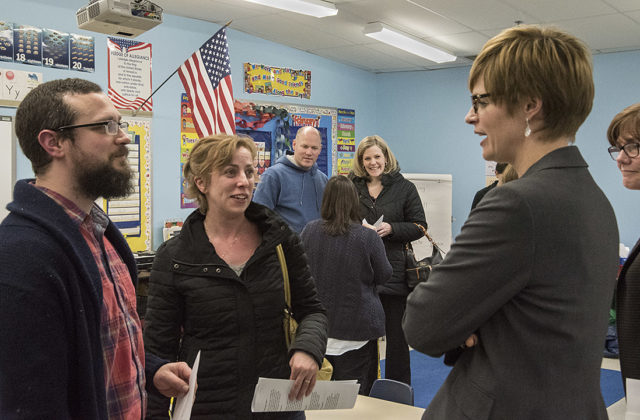Multiage Classrooms Are Coming to Botelle School
By Lindsey Pizzica Rotolo
If public school teachers are often wary of innovation after recent waves of federally mandated programs, that is not the case at Botelle School. Kindergarten teacher Deb Tallon and first-grade teacher Bea Tirrell have enthusiastically embraced plans for the first multiage classrooms in the fall. Tallon and Tirrell will be splitting the rising kindergarten and first grade students into two groups of 10, and look forward to the opportunity to collaborate on the pilot program.
Multiage classrooms are already in place in elementary schools in Falls Village, Cornwall, Warren and Union, serving as a wonderful tool for teachers and administrators faced with declining enrollments in sparsely populated, rural areas.

The teachers who will be teaching the multiage classes, Bea Tirrell and Deb Tallon, left and center left, with Lauren Valentino, center right, the principal, and Mary Beth Iacobelli, the superintendent of Botelle.
Of course, the multiage classroom is not exactly a trailblazing innovation. The beginnings of public education in this country revolved around children of various ages being taught by the same teacher for several years. The one-year grading system was not implemented until the mid-1800s, and was largely a reaction to the Industrial Revolution and the need for reform in rapidly expanding urban schools. Outside of public education, Dr. Maria Montessori’s widely adopted teaching philosophy was built around the three-year age grouping, which has persisted in Montessori schools across the country for over a century.
Superintendent Mary Beth Iacobelli’s interest in multiage classrooms began as an answer to parents’ concerns over a lack of creativity and the removal of “fun in learning” because of strict adherence to Common Core standards. “Multiage classrooms will create a more innovative, kid-focused educational experience,” says Iacobelli.
Multiage classrooms at Botelle will give teachers the opportunity to spend two years with each child and increase their understanding of each student. The children fluctuate year-to-year between a position of being an “older,” who can guide and teach to a “younger,” who can benefit from student-to-student learning as well as from the teacher. Botelle will also be adopting a more student-directed learning environment where the children are more empowered to make their own choices in the classroom.
As opposed to traditional public education where all children are expected to be at the same point at the end of one school year, kids now have two years to learn and grow at their own rate. Principal Lauren Valentino says, “Kids learn differently—some are visual learners, some learn more by listening, others through movement…this is a great opportunity for them to learn the way that is most natural for them.” The new model also eliminates the glass ceiling problem—in the current Botelle classroom, teachers can’t make use of third grade material if a second grader is ready for it, for example, but the multiage classroom teacher will be poised for that.

Parents of next year’s kindergartners and first graders listen as Dr. Iacobelli describes the program.
While the positive aspects of a small school seem to outweigh the negatives, most members of the Botelle community agree that the social and interpersonal limitations of having just one classroom at each grade level is quite limiting. Especially in the case of years that have a very small enrollment (like next year’s kindergarten class that has just four children), multiage classrooms are a great solution.
Iacobelli hopes to roll out the program across all grade levels over the next three years, but realizes it may progress more quickly than that, or could be delayed. The Warren Elementary School, which has served as a model for Botelle, thought it would take five years to implement the program but ended up implementing it fully in just two years.
A parent meeting on the subject was held on Feb. 22 with 11 parents in attendance. Ann DeCerbo, a Botelle parent and Board of Education member, opened the parent question-and-answer session by sharing her experience observing a classroom in Warren. DeCerbo said she was nervous at first about the program, but minutes into her observations she came around. “Seeing it work at the Warren school was enlightening. I was so struck by how articulate and confident the children were about their work,” says DeCerbo.
One of DeCerbo’s main concerns about the more kid-guided approach was that children would be inclined to choose easier work when given a choice, but the Warren school was proof that children accelerate their studies without constant instruction from the teacher. Other parent concerns were long term support for the staff, how the kids will be divided and the likelihood of the program persisting into the future, all of which were quickly quieted.
Dr. Sandra Stone, the director of the National Multiage Institute, will be spending the day at Botelle School on Wednesday, March 8. She will meet with parents and teachers and can address any concerns from the community.
Photos by Bruce Frisch.

